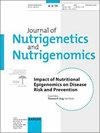个性化营养代谢生物标志物的鉴定。
Q Agricultural and Biological Sciences
Journal of Nutrigenetics and Nutrigenomics
Pub Date : 2012-01-01
Epub Date: 2012-09-04
DOI:10.1159/000342702
引用次数: 8
摘要
本文章由计算机程序翻译,如有差异,请以英文原文为准。
Identification of metabolic biomarkers for personalized nutrition.
Now more than ever, we have begun to appreciate the roles of individual physical and genetic variation in health and medicine. A great deal of research attention has recently been devoted toward personalized medicine, in which technologies like medical genetics are used to determine information such as how a patient is likely to respond to a treatment or the optimal dose of a drug. While drug therapy will undoubtedly advance as a result of this new focus, it is critical that we not overlook the importance of personalized nutrition in disease management and health promotion. Indeed, personalized nutrition may be even more critical than personalized medicine given that dietary intake is a fundamental part of everyday life that affects our health. The fields of nutrigenetics and nutrigenomics present uniquely powerful sources of information for implementing personalized nutrition. Nutrigenetics specifies how individual genetic variance impacts response to nutrients such that an individual can avoid negative metabolic consequences by choosing appropriate foods. One classic example is lactose intolerance, in which one lacks the lactase persistence allele and therefore cannot digest lactose [1] . Thus, this person’s health would benefit from avoiding foods containing lactose. On the other hand, nutrigenomics explores how nutrients affect gene expression, so that ingesting certain nutrients according to an individual’s health condition can normalize their diseaserelated gene expression. For example, increased systemic inflammation is linked to an upregulation of inflammatory cytokines (e.g. TNF , IL-1, IL-6), which can in turn be suppressed by some nutrients (e.g. omega-3 fatty acids [2] ). The key element linking these ‘sister’ fields is the concept that nutrients interact with an individual’s genetic profile to impact their health. Thus, as each individual has their own unique genetic profile, this knowledge is essential for developing personalized nutrition. The critical prerequisite for personalized nutrition is the ability to precisely detect and interpret an individual’s metabolic and health status by way of metabolic biomarkers. These
求助全文
通过发布文献求助,成功后即可免费获取论文全文。
去求助
来源期刊

Journal of Nutrigenetics and Nutrigenomics
GENETICS & HEREDITY-NUTRITION & DIETETICS
CiteScore
1.86
自引率
0.00%
发文量
0
审稿时长
>12 weeks
期刊介绍:
The emerging field of nutrigenetics and nutrigenomics is rapidly gaining importance, and this new international journal has been established to meet the needs of the investigators for a high-quality platform for their research. Endorsed by the recently founded "International Society of Nutrigenetics/Nutrigenomics", the ‘Journal of Nutrigenetics and Nutrigenomics’ welcomes contributions not only investigating the role of genetic variation in response to diet and that of nutrients in the regulation of gene expression, but is also open for articles covering all aspects of gene-environment interactions in the determination of health and disease.
 求助内容:
求助内容: 应助结果提醒方式:
应助结果提醒方式:


